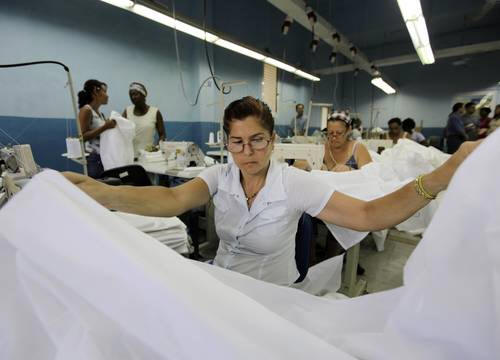
The isolation of the people of Cuba benefits the government of Raul Castro says
Cuban opposition to demand the U.S. Congress to "soften" the blockade against Cuba
The hunger striker Guillermo Fariñas, among the more than 70 dissidents who signed the petition
Cuban opposition demands US Congress
"soften" blockade against Cuba.

One aspect of FAMA state factory that makes clothes for shops that sold all over Cuba at affordable prices to the workers. In the picture, workers during a normal day of work at The Habana
Foto Reuters
Gerardo Arreola
Correspondent
La Jornada
Saturday June 12, 2010, p. 21
A CubaNews translation. Edited by Walter Lippmann.
Havana, June 11. More than 70 opponents of the government of President Raul Castro asked the U.S. Congress to approve a bill allowing Americans to travel and facilitate agricultural sales to Cuba, as a way to "ease the transition we want" and " significantly strengthen civil society in the island.
"It's the first time there as wide a participation of the Cuban opposition to such management," said Manuel Cuesta Morua La Jornada, the opposition group Arco Progressive Social profile.
Besides Cuesta, signed the petition Guillermo Fariñas, who has more than 100 days on hunger strike and thirst and in intensive care, demanding the freedom of opposition prisoners; Marcelo Cano, José Luis García Paneque, Julio César Gálvez, Ricardo González Alfonso Pablo Pacheco Ávila, the group of 75 detainees and sentenced in 2003.
The letter was addressed to the Committee on Agriculture of the House of Representatives, whose chairman, Democrat Collin Peterson, argues that Cuba may be a large market for U.S. agricultural exporters.
The project H. R. 4645, which prohibits both the release of trips as a more dynamic agricultural sales, has received support from business circles of both drafts, the Catholic Bishops Conference of the United States and to humanitarian organizations like Amnesty International and Human Rights Watch, an initiative that could be voted on this month.
"The isolation of the people of Cuba benefit hardliners in the best interests of the government, while the opening serves to inform and empower the Cuban people, and help further strengthening of our civil society," said the letter, also signed by Dagoberto Valdes, editor of Living; Elizardo Sanchez of the illegal but tolerated Cuban Commission for Human Rights and National Reconciliation, the blogger Yoani Sánchez and Juan Almeida, son of the late commander of the Revolution Juan Almeida.
Peterson said that with two strong mobile, the release of travel and a boost agricultural exports to the United States, the project can gain enough votes to carry the full House.
"As travel freely is a right of every human being, we support the passage of this bill," said the letter. "The current Cuban government has always violated this right and, in recent years, wields in his favor that the U.S. government also restricts freedom of travel to their own citizens."
Also joined the lawsuit former political prisoners and Francisco Chaviano Felix Bonne, and Roberto de Miranda, Oscar Espinosa Chepe, Héctor Palacios and Jorge Olivera, the group of 75, which are released for health reasons.
http://www.jornada.unam.mx/2010/06/12/index.php?section=mundo&article=021n1mun

suavizarel bloqueo contra la isla
Demanda la oposición cubana al Congreso de EU
suavizarel bloqueo contra la isla

Corresponsal
Periódico La Jornada
Sábado 12 de junio de 2010, p. 21
La Habana, 11 de junio. Más de 70 opositores al gobierno del presidente
Raúl Castro pidieron al Congreso de Estados Unidos que apruebe un
proyecto de ley que permitiría los viajes de los estadunidenses y
facilitaría las ventas agrícolas a Cuba, como una forma de "favorecer la
transición que deseamos" y "fortalecer de manera significativa la
sociedad civil" en la isla.
"Es la primera vez que hay una participación tan amplia de la oposición
cubana para una gestión de este tipo", dijo a La Jornada Manuel Cuesta
Morúa, del grupo opositor Arco Progresista, de perfil socialdemócrata.
Además de Cuesta, firmaron la petición Guillermo Fariñas, quien lleva
más de 100 días en huelga de hambre y sed y en terapia intensiva,
reclamando la libertad de opositores presos; Marcelo Cano, José Luis
García Paneque, Julio César Gálvez, Ricardo González Alfonso y Pablo
Pacheco Ávila, del grupo de los 75 detenidos y sentenciados en 2003.
La carta fue dirigida al Comité de Agricultura de la Cámara de
Representantes, cuyo presidente, el demócrata Collin Peterson, sostiene
que Cuba puede ser un gran mercado para los agroexportadores
estadunidenses.
El proyecto H. R. 4645, que prevé tanto la liberación de viajes como un
mayor dinamismo en las ventas agrícolas, ha recibido el respaldo de
círculos empresariales de ambos giros, la Conferencia de Obispos
Católicos de Estados Unidos y hasta organizaciones humanitarias como
Amnistía Internacional y Human Rights Watch, iniciativa que podría
someterse a votación este mes.
"El aislamiento del pueblo de Cuba beneficia a los intereses más
inmovilistas del gobierno, mientras que la apertura sirve para informar
y empoderar a los cubanos, y ayudar a un mayor fortalecimiento de
nuestra sociedad civil", señaló la carta, que también está firmada por
Dagoberto Valdés, editor de la revista Convivencia; Elizardo Sánchez, de
la ilegal pero tolerada Comisión Cubana de Derechos Humanos y
Reconciliación Nacional, la bloguera Yoani Sánchez y Juan Almeida, hijo
del desaparecido comandante de la revolución Juan Almeida.
Peterson ha dicho que con dos móviles fuertes, la liberación de viajes y
un impulso a las agroexportaciones hacia Estados Unidos, el proyecto
puede ganar los votos suficientes para llevarlo al pleno de la Cámara.
"Como viajar libremente es un derecho de todo ser humano, apoyamos la
aprobación de este proyecto de ley", señaló la carta. "El actual
gobierno cubano ha violado siempre este derecho y, en los últimos años,
esgrime a su favor que el gobierno de Estados Unidos también coarta la
libertad de viajar a sus propios ciudadanos".
También se unieron a la demanda los ex presos políticos Félix Bonné y
Francisco Chaviano, así como Roberto de Miranda, Oscar Espinosa Chepe,
Héctor Palacios y Jorge Olivera, del grupo de los 75, que están
excarcelados por razones de salud.